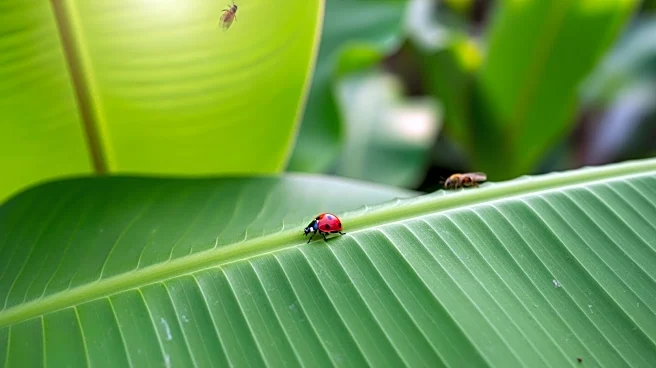What's Happening?
The Department of Agriculture has issued a warning to South African banana farmers regarding the banana bunchy top virus (BBTV), a significant threat to banana plantations. Recent research indicates that biological control methods could effectively combat
the spread of this virus. At a workshop held at the Du Roi Laboratory in Letsitele, Natja van Heerden from Koppert presented findings from a trial in Zambia where natural enemies of aphids, the virus carriers, were used to control BBTV. The trial demonstrated that using ladybirds and parasitic wasps significantly reduced the number of infected plants compared to traditional methods. This approach offers a sustainable alternative to chemical pest control, which is becoming increasingly limited.
Why It's Important?
The banana bunchy top virus poses a serious threat to banana production, which is a vital agricultural sector in South Africa, particularly in regions like Limpopo and Mpumalanga. The successful trial in Zambia suggests that biological control could prevent major economic losses for farmers by reducing reliance on chemical pesticides. This method not only helps in managing the virus but also supports environmental sustainability by promoting biodiversity. The Department of Agriculture's campaign encourages farmers to adopt these practices, potentially safeguarding the industry and ensuring food security.
What's Next?
Farmers are urged to integrate BBTV monitoring into their pest management programs and report any signs of infection. The Department of Agriculture's #StopBBTV campaign aims to raise awareness and promote the use of virus-free planting material. Koppert's approach, which includes technical support and the development of integrated pest management systems, could be expanded to other regions facing similar challenges. Continued research and collaboration with producers will be crucial in refining these biological control methods and ensuring their effectiveness.
Beyond the Headlines
The trial's findings highlight the importance of maintaining some plant diversity, as certain weeds can attract natural predators that help control aphid populations. This insight challenges traditional farming practices that often involve complete weed removal, suggesting a shift towards more ecologically balanced approaches. The success of biological control methods could lead to broader adoption of sustainable agricultural practices, influencing policy and industry standards.

















